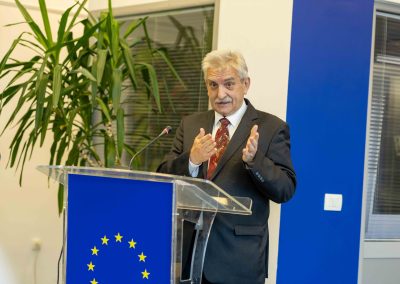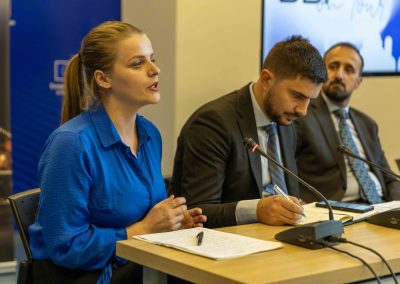The Budapest Balkans Forum on Tour (BBF On Tour) program series of the Hungarian Institute of International Affairs (HIIA) continued in Pristina on 7 December 2023, co-organised with the Embassy of Hungary in Pristina. The event entitled “To stay or not to stay? The Western Balkans’ Dilemma” started with the keynote speech of H.E. Besnik Bislimi, First Deputy Prime Minister for European Integration, Development and Dialogue, followed by an expert-level panel discussion featuring speakers from Kosovo and Hungary. The conversation centred around the demographic crisis in the Western Balkans and the challenges of brain drain.
In his opening remarks, President of HIIA, Gladden J. Pappin summarized the essence of the Budapest Balkans Forum as a signature conference of the Institute. Mr. Pappin highlighted that in accordance with the Hungarian foreign policy priorities, HIIA puts a lot of emphasis on the Western Balkans and the region’s EU integration. He underlined that the Budapest Balkans Forum and the BBF on Tour program series are testaments to the dedication of the Institute in bringing the region and discussions about the region closer to the EU. Ambassador Béla Bozsik also stressed that Hungary supports the EU integration of the region, which is demonstrated by the fact that Budapest delegates EU integration experts to all Western Balkan capitals. The Ambassador expressed his appreciation for HIIA, which has just celebrated its 50th anniversary, noting that the jubilee also proves the importance and relevance of the Institute’s work.
Deputy Prime Minister Bislimi addressed the demographic and economic challenges of emigration from Kosovo and the Western Balkans, emphasizing the moral implications of visa liberalization for Kosovar passport holders within Europe. Highlighting the personal and economic reasons behind emigration, including the pursuit of stability, better opportunities and living conditions, he acknowledged the impact that this has on the nation and pointed out the need to come up with strategies that address the root causes of the phenomenon. Deputy Prime Minister Bislimi proposed three key recommendations to direct the terrain of migration: economic development, strengthening social infrastructure and services, and implementing effective migration policies and diplomacy. He advocated for an approach that includes securing the well-being of citizens, enhancing the social safety net and shaping migration policies that balance national interests with global solutions.
Following the Deputy Prime Minister’s remarks, the panel discussion featured Julianna Ármás, Research Fellow of HIIA, Krenare Gashi, Head of the Local Branch Office of the Regional Youth Cooperation Office (RYCO), Ramadan Islami, Program Coordinator at the Deutsche Gesellschaft für Internationale Zusammenarbeit (GIZ) and Mehdi Sejdiu, PhD Candidate at the University of Heidelberg. The discussion was moderated by Ferenc Németh, Program Manager and Research Fellow of HIIA.
Outlining the main roots of emigration from the Western Balkans, Ms. Gashi pointed out economic insecurities and unemployment, especially among youth. These factors are further exacerbated by brain drain towards Western Europe as professional growth opportunities in the region are still limited. She also highlighted the lack of proper educational opportunities: the youth perceives that the knowledge they gain through formal education is not in sync with what the labour market demands. According to Ms. Gashi, there are two specific aspects that might also lead to emigration: 1) the lack of a regional approach towards tackling the above-mentioned problems; 2) the lack of youth involvement in designing youth-focused policies or policies that might decrease the level of emigration.
Also reflecting on the question about the roots of migration, Mr. Sejdiu stated that migration as a process is normal, yet we perceive this phenomenon differently in the Western Balkans and within the EU, since in the European Union, it is not called migration but mobility (free movement of people). He claimed that a vibrant democracy like Kosovo provides a good environment for building trust between institutions and people, and this can lead to decreased emigration. According to Mr. Sejdiu, the greatest challenge is that the pace of development (i.e., the implementation of reforms) does not meet the expectations of citizens. Similarly to his fellow panellists, Mr. Islami stressed that push factors have always been present in the region and little can be done to mitigate their impacts. It is however important to talk about not only migration but the opportunities which the diaspora could offer, and exploit the development potentials with their help. Ms. Ármás pointed out that Hungary deals with the same issues in the fields of emigration and demographic challenges as the Western Balkans. One must first realize and talk about these challenges as academia tends to discuss political issues instead of structural, economic problems. The research fellow added that there is also a tradition of leaving the Balkans (the so-called culture of guest workers/Gastarbeiter) which may also contribute to emigration.
As the local panellists emphasized the importance of diaspora engagement, the discussion continued along that aspect of the topic. Mr. Islami started that GIZ has projects where they encourage members of the diaspora to come back and work in the public sector or to share business ideas with their local communities. He also stressed the importance of providing mentorship for women so that they would be able to enter the local labour market. Mr. Sejdiu, a former participant of GIZ’s program, argued that this initiative helped participants to (re)socialize to their home country’s structures. He also underlined that administrative burdens must be abolished to incentivize business opportunities between diaspora and the home country. According to Ms. Gashi, the main problem is that there is no strategic approach in using the potentials of the diaspora. She said that if we are to engage the diaspora, we must find ways to turn their involvement into success stories for the home countries.
The discussion continued with the issue of FDI inflow to the Western Balkans. Ms. Ármás highlighted the importance of inward FDI to high-added value sectors which is the key to long-term, continuous improvement. On the other hand, the Western Balkans faces the same challenge as Central and Eastern Europe: labour shortages and the need to import labour force. Mr. Sejdiu agreed with that idea that in addition to emigration, a new trend has emerged and is already visible in the Western Balkans: immigration. The problem is that the region is not ready for immigration since there is no strategy or previous experience on how to properly handle it. A proper institutional framework must be introduced that includes work permits and cooperation with companies that employ foreign workers as well as with the workers’ countries of origin. Mr. Islami mentioned that a new law on foreigners is already in the works in Kosovo: it will be easier to get access to work permits. In addition, there is a need for capacity-building in institutions to implement the new regulations and ensure fair application procedures. Proper working conditions and access to social services are also of high importance.
At the end of the panel discussion, participants discussed whether there are any regional cooperation mechanisms to reduce emigration. Mr. Islami mentioned the regional mobility agreement between Albania and Kosovo, and added that cooperation of employment agencies from the region would be essential for the sake of providing safe working conditions to foreign workers. Lastly, Ms. Gashi drew attention to the Berlin process as an important instrument in this regard, and also proposed the establishment of a labour migration database.









